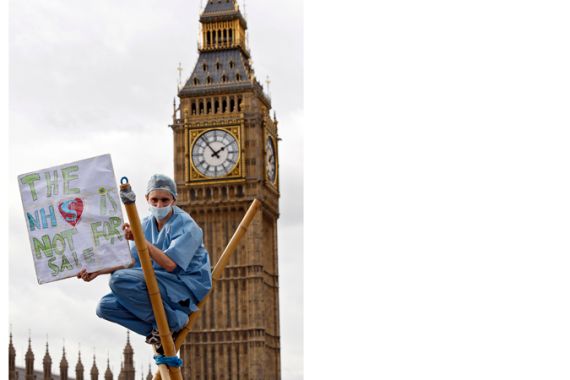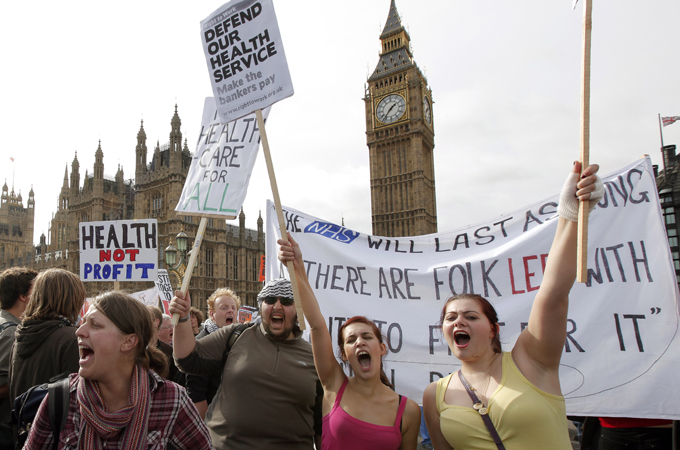The politics of health
Mental illness and obesity are rising in the UK and US, leading activists to fight for a new approach to healthcare.

 |
| A “full and unlimited democracy” could improve public health outcomes, author argues [EPA] |
In the late 1840s, typhus fever broke out in Upper Silesia, a Prussian province in what is now Poland. The education ministry sent a physician called Rudolf Virchow to investigate. While Virchow identified insanitary working conditions as the immediate cause of the epidemic, he traced its origins to the region’s lack of political liberty. In the absence of free institutions the inhabitants were “poor, ignorant and apathetic”. In order to prevent a recurrence of the disease Virchow recommended a remedy that he summarised in a few words: “full and unlimited democracy”.
Modern day Britain and America are not in quite the same condition as Upper Silesia. We are not dying in the thousands from typhus and starvation. But we are not well, either. The problems with the US healthcare system are well known. Millions lack adequate insurance coverage, and thousands suffer unnecessarily and die prematurely as a result.
There are other, more insidious problems. We are living through what appears to be an epidemic of loneliness and distress. By the beginning of the century in Britain one in six adults suffered from a neurotic disorder, most likely anxiety, depression, or both. In 2004, a Department of Health study estimated that around a quarter of all adults had “an alcohol use disorder”.
According to the psychologist Bruce Levine between a fifth and a quarter of Americans are receiving drug treatment for psychiatric disorders. He notes, too, that there is an epidemic of compulsive and addictive behaviour. These compulsions and addictions exact a terrible toll on people’s physical health.
Ineffective care
As in Silesia in the 1840s, there is no shortage of medical and bureaucratic expertise in America or Britain. But the treatments approved and promoted by experts haven’t been terribly effective. Governments have tried to promote balanced nutrition and healthy lifestyles, though they have been wary of upsetting the producers of high-margin, branded and processed foods.
About a third of American adults are obese and around three hundred thousand people a year die as a result of being overweight, somewhat more than typhus killed in Silesia at the height of the epidemic.
In fact the bureaucracy’s reluctance to irritate the food industry has sometimes shaded into abject collaboration with it. At one point the US Department of Agriculture was running an anti-obesity campaign while helping Domino’s to develop a range of pizzas with 40 per cent more cheese.
Meanwhile, doctors treat mental distress with drugs that are of highly questionable value. Much of the medical profession appears convinced that mental distress is an issue for individuals. The ‘socio-logical’ approach of Virchow is driven to the margins while the rates of mental illness steadily climb. It is a funny kind of progress. Perhaps physicians notice their countries’ deepening insanity but they remain more eager to rearrange their patient’s brain chemistry than the political arrangements they share with them.
All in all, many modern efforts to promote public health from above seem about as effective as the efforts to deliver general prosperity. In both instances experts enthusiastically prescribe treatments that are demonstrably useless or harmful. There is no lack of originality or creativity, as long as it is accepted that only a minority is qualified and that the majority must wait patiently until conditions improve. Every course of treatment can be considered, in other words, except the one that Virchow proposed back in 1848, ‘full and unlimited democracy’.
Winds of change
But there are signs that this is starting to change. More and more people in both Britain and America are starting to act as if they were the citizens of a free Republic. There are protesters occupying public spaces in hundreds of American cities and towns. This weekend will see thousands of people join them in Great Britain.
Now that mainstream commentators and journalists have stopped ignoring the protesters in America they are busy complaining that they don’t have a coherent plan for social and political reform. This is, of course, to miss the point. People are engaging in open deliberation about the kind of world they want and how to get there. After years of being told to keep quiet and pick from the items on the menu provided, the mere fact of effectual freedom is invigorating. These thousands will go home and meet with thousands more. They will discover they have more in common with the people they meet than with the personalities that appear on television and radio. Those who wish to converse as equals will finally do so uninterrupted by those who long to address ecstatic crowds.
We are witnessing a reinforcing wave of political actions. One doesn’t cause the next but they inform and embolden one another. We look to the Middle East and Southern Europe and see what is possible, and what is at stake. We see people not so different from ourselves decide that this is as good a time as any to be free. We feel a little less helpless when we see that change can happen without the blessing of the media, and that leaders will, in the end, rush to follow.
|
“We are starting to realise we have the power to change things. “ – Dan Hind |
No matter how shrill the mainstream media has become, we are starting to realise that we have the power to change things, that the decision to start is itself transformative. We don’t have to cling to a single party line, or prove to journalists that we are serious and committed. We can be candid with one another and work patiently to understand what is happening now and what needs to be done.
It will take a little while to figure out what we don’t know and to figure out where the dividing lines really are. Differences of opinion and interest will not vanish. We are looking to improve things, not to impose perfection on the world. The occupations will not, I imagine, create the disciplined army of revolutionaries that some still dream of. They will create something altogether more terrifying to those who love hierarchy and the power that comes from the suppression of others – they will create citizens with the confidence and skills to make common cause with one another, in pursuit of individual liberty and public freedom.
No one can safely predict where the occupations will lead. But it is reasonable to expect that another wave of action will follow them. The abuses of our leaders are now too glaring, the costs of their corruption too high. My guess is that the protesters will go home, and find each other, and find others. The assemblies in Manhattan and Westminster, in cities all over the world, will resume on an ever greater scale. More and more of us will discover how it feels to deliberate without limit. More and more of us will discover that our fellow citizens are both more sensible and more creative than the media have taught us to expect.
Perhaps we are finally about to try the remedy Virchow proposed, and set about creating a “full and unlimited democracy”. We have tried everything else. We have trusted all kinds of experts. We have voted for charismatic leaders. We are left with all we really ever had – each other.
Dan Hind is the author of The Threat to Reason and The Return of the Public this year’s winner of the Bristol Festival of Ideas Book Prize.
You can follow Dan on Twitter: @danhind
The views expressed in this article are the author’s own and do not necessarily reflect Al Jazeera’s editorial policy.
